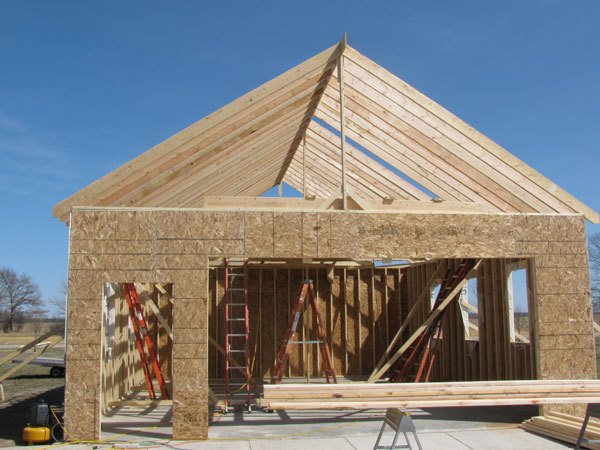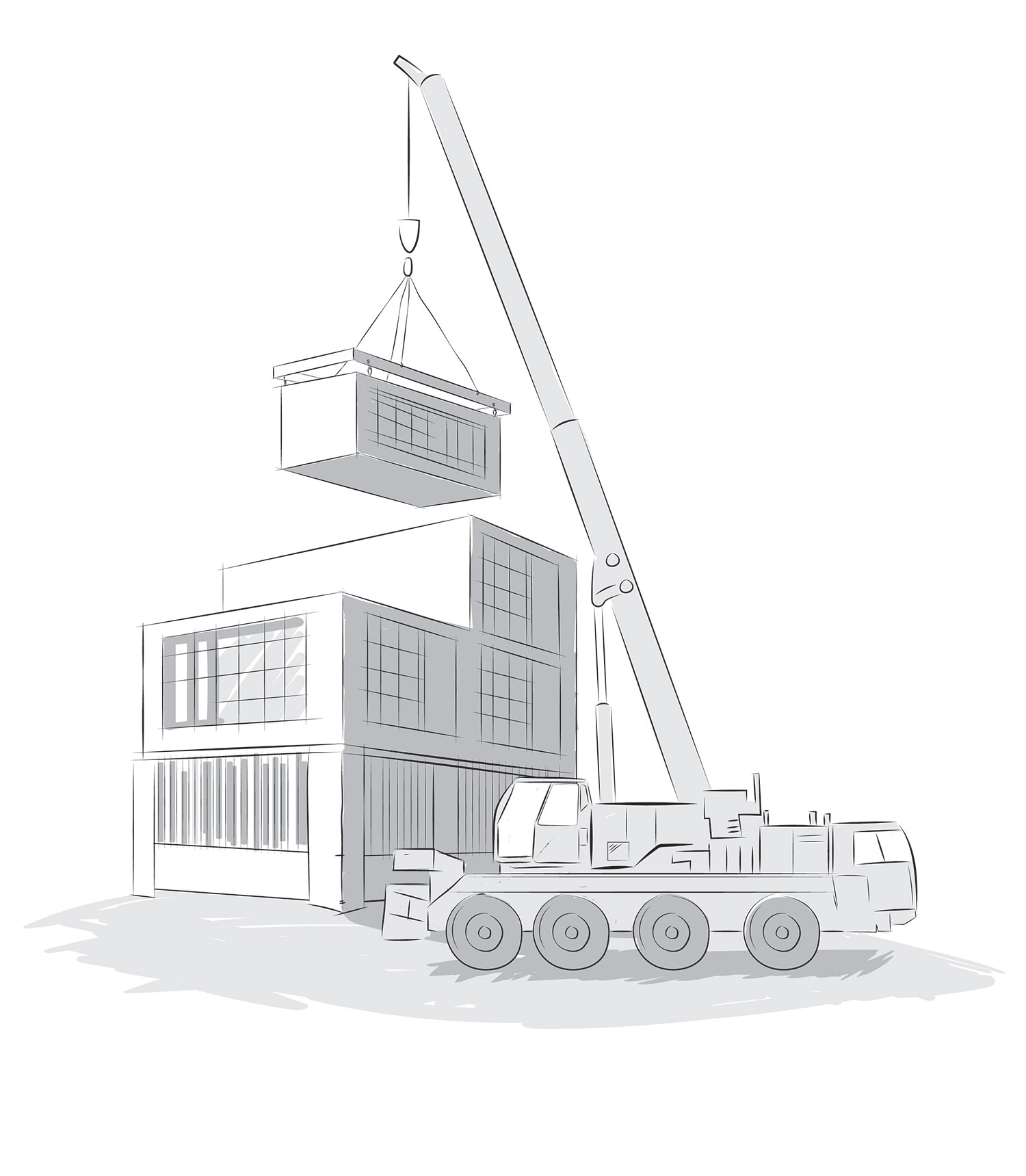So you’ve decided to build a new home… Congratulations! The next step in bringing your dream home to life is securing a construction loan. In this post, we’ll discover how new home construction loans work (also known as a Construction to Permanent Loan). Read on to learn all you need to know about new construction loans and how to get one.

Where should I look for construction loans?
Finding a construction lender is as easy as typing “new construction loan, {your city}” into a google search. Be careful though, many home builders will attempt to lure you to their website and push you to buy or build a home through them, claiming that “we can finance you.” In reality, no residential home builder can “get you a loan” because they are not a bank. All they are doing is referring you to a lender; they are not getting you a loan themselves.
That said, a good builder will be helpful in referring you to a new construction lender. They should also be available and knowledgeable to answer any questions you have about the loan or the overall process. At Next Modular, we have a wealth of knowledge about traditional new construction loans, USDA construction loans, FHA loans, and even VA and VA construction loans, and we’re more than happy to answer any questions you have about these.
The best source for a new construction loan will usually be your small-town local bank. These banks are invested in your local community and if they do construction loans they will be glad to continue their legacy by helping you build your home. If you already bank with a small-town lender, give them a call and ask if they do construction loans. If they don’t they’ll be able to refer you to someone who does, and if they can’t do that, give us a call and we can get you pointed in the right direction!
What kind of credit score do I need for a construction loan?
You will generally need a 700 credit score or higher to qualify for a traditional construction loan. Some lenders will go below this, depending on your individual circumstance. It is also possible to obtain an FHA or VA construction loan, which would have lower down payment and credit score requirements, but these are sometimes difficult to process because of the amount of paperwork involved, and there are not a lot of lenders willing to offer this loan. Recently, the USDA rolled out a true no-money down USDA construction loan, so if your land is in a qualifying area, this could be a great option for you!
How is this any different from a traditional loan?
We all know how traditional loans work: 1) get a loan approval — 2) find a home to buy — 3) make an offer, buy the home, and move in.
Traditional loans are easy because there is an existing home for the bank to loan on. The bank approves you for a loan amount, appraises the value of the home you’re interested in, and loans you the money to purchase the home.
NEW construction loans are a little different, here's how:
The construction loan will pay for all the costs of construction to build your new home, such as the land, the home foundation, well, septic, garage, porch, the home itself, landscaping, mailbox, permits, lawn seeding, concrete paths/driveway, tree removal/lot prep, and anything else you want to be done that is related to the construction of your new home (make sure everything you need to be done is listed in your building contract with your contractor).
So the loan will pay for the cost of construction, but because there is currently no existing home to appraise, the bank will have to figure out what the future value (aka the as-built value) of your dream home is going to be. They do this by hiring an appraiser to determine what the market value of the proposed home will be once it’s done, given the local market conditions, size of home you’re building, and value of the land you want to build on.

Most banks will require that you have at least 20% equity in the hard costs of the entire land/home package when it’s all said and done in order to give you the loan. What does this mean?
Let’s say the land you want costs $30,000, and home will cost $170,000 to build. In this case, you would need to bring a cash down payment equal to 20% of the hard cost of construction (land cost + home cost) in order to secure this construction loan. So $200,000 X 20% equals $40,000 cash needed.
IMPORTANT NOTE:
There are banks that can do construction loans for as little as 4% down! However, it is important to understand that when you put less than 20% down on your loan, you will have to pay Private Mortgage Insurance (PMI). PMI is usually .5% to 1% of the loan balance per year. So if you have a $100,000 loan and the PMI is 1% per year, you will have to pay $1,000 per year on top of your normal loan payments, property taxes, and home insurance. This $1,000 is usually split up and paid on a monthly basis.
What if I own my land outright?
If you own your own land and don’t owe anything on it, in many cases the bank will give you credit for the value of your land. So if your land appraises at $20,000 and the home you want will cost $80,000 (for a total hard cost of $100,000) then your land would be of sufficient value to cover your down payment, because 20% of 100,000 is $20,000, and your land is already worth $20,000.
How do I get a new loan started?
When obtaining a construction loan from a bank, it all starts with the pre-approval. After your initial meeting, the bank will ask for tax returns, income statements, paperwork on existing debt that you have, and also run your credit in order to determine how much they are willing to loan you. As long as everything looks good they will give you a loan pre-approval.
Armed with a pre-approval amount, you can now begin to search for land and locate a builder who can build you a home within your budget. Once you find the land and get a quote from your builder, you compile this information and submit it to the bank for final approval.
The bank will review your paperwork and order an appraisal to determine the future value of the home. Once everything checks out, the bank will finalize things on their end. The will want you to have at least 20% equity in the deal. We then schedule a starting date for your construction loan.
Now the fun begins!
Once the construction loan begins, you can purchase the land and your contractor can begin building your home!
What are construction loan “draws”?
Over the course of construction, your builder will get money from the bank in draws. A draw is an amount of money paid out by the bank to cover the ongoing costs of construction. The first draw typically covers the purchase of your land. Your builder will then need periodic draws to cover his cost to build your home. There is typically a draw to cover the foundation and site clearing costs. You may also have a draw for the well and septic system, and a draw for the garage and other outbuildings.
Once you make the final draw, your builder will do a final walk-through of the home with you. This allows them to take care of any odds and ends type issues you may find. After you sign off on the home and all final inspections are complete, you’ll receive your Certificate of Occupancy from the local building department. Almost there!
The final step is to have a closing at your bank. They will convert your temporary construction loan into a traditional mortgage.
You can think of a home construction loan as a giant credit card that the bank gives you for a period of time to get your home built. Need a foundation…? *swipe!* Need a garage…? *swipe!*
Then, once the home is finished, the bank “re-finances” your “credit card” with a traditional home loan.
Congratulations! You are now the proud owner of a brand new home! It’s time to kick back and enjoy your new investment.
Call for Help With Your Construction Loan
(While this outlines the basic construction loan process for a typical home, every situation is different. Your small-town bank will be a key resource to guide you through the process. If you are still needing more help understanding the process, you can always contact us, and we’ll be more than happy to explain everything and help you find a lender)
At Next Modular, we know that choosing a home is likely one of the most important financial decisions you will make. As an experienced modular home builder, we are committed to being your guiding light through this process.





